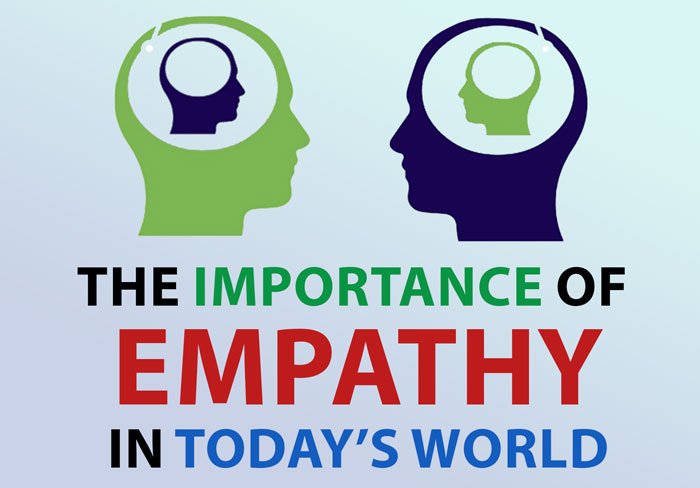
The Importance of Empathy in Today’s World
The Importance of Empathy is a fundamental human quality that holds significant importance in today’s world, perhaps now more than ever. It is the ability to understand and share the feelings of another person, to put oneself in their shoes, and to respond with compassion and care. In a world that is increasingly diverse, interconnected, and faced with numerous complex challenges, empathy plays a crucial role in fostering understanding, cooperation, and positive change. Here are several reasons why empathy is particularly vital in today’s society:
- Globalization and Cultural Diversity: In an interconnected world, individuals from diverse cultures and backgrounds interact on a daily basis. Empathy helps bridge the gap between these cultures by promoting understanding, respect, and appreciation for each other’s differences.
- Social Inclusion and Equality: Empathy encourages inclusivity and promotes equal treatment for all individuals, regardless of their race, gender, ethnicity, socio-economic status, or abilities. It helps us recognize and address the unique challenges faced by different groups, fostering a more just and compassionate society.
- Mental Health and Well-being: Empathy is essential for supporting those struggling with mental health issues. By understanding and acknowledging the emotional experiences of others, we create an environment of understanding, reduce stigma, and provide a sense of belonging and support.
- Conflict Resolution: Empathy is a vital tool in resolving conflicts and disputes peacefully. By understanding the perspectives and concerns of all parties involved, it’s possible to find common ground and work towards mutually beneficial solutions.
- Leadership and Teamwork: Effective leadership in the contemporary world requires a high degree of empathy. Leaders who understand and connect with their team members on an emotional level can motivate, inspire, and build a cohesive team that works together towards shared goals.
- Healthcare and Caregiving: In healthcare and caregiving professions, empathy is essential for providing compassionate and patient-centered care. Understanding a patient’s emotional and physical needs helps in tailoring treatments and support, ultimately improving outcomes and patient satisfaction.
- Technology and Social Media: The digital age has brought new challenges, including cyberbullying and online harassment. Empathy is crucial in promoting respectful and responsible behavior online, ensuring that technology is used to uplift and connect rather than to harm or isolate.
- Environmental Awareness: Empathy extends beyond human interactions to encompass our relationship with the environment. Understanding the impact of our actions on the planet and other species fosters a more sustainable and responsible approach to the environment.
- Education and Learning: Empathy within the educational system can lead to a more inclusive and supportive learning environment. Teachers and students who understand and relate to each other’s experiences and needs can collaborate more effectively in the learning process.
- Community and Social Engagement: Empathy motivates individuals to engage with their communities, contribute to social causes, and support those in need. It promotes a sense of responsibility and encourages active involvement in creating positive change.
In summary, empathy is a critical component of a compassionate, understanding, and harmonious society. It enables us to navigate the complexities of our diverse world, promote social justice, and cultivate meaningful connections with others. Encouraging and practicing empathy is essential for creating a better and more inclusive future for all
Title: The Crucial Role of Empathy in Today’s Interconnected World
In a world where technology connects us more than ever before, where globalization has blurred geographical boundaries, and where diversity is celebrated, empathy stands as a cornerstone of our humanity. Its significance in contemporary society cannot be overstated. Empathy, the ability to understand and share the feelings of another, to envision oneself in their circumstances and respond with care and compassion, is a fundamental quality that not only defines our relationships but also shapes the very fabric of society. In an era faced with multifaceted challenges, fostering empathy is paramount for a more understanding, compassionate, and cooperative world.
First and foremost, globalization and the resulting cultural diversity highlight the necessity of empathy. Our world is a melting pot of cultures, ethnicities, languages, and traditions. With globalization facilitating interactions and collaborations across borders, empathy becomes the bridge that closes gaps and nurtures understanding among individuals from diverse cultural backgrounds. Empathy allows us to appreciate and respect the differences that make each culture unique, promoting a harmonious coexistence on a global scale.
Inclusivity and equality are ideals that humanity continually strives for. However, achieving these goals necessitates empathy. In our diverse society, empathy fosters inclusivity by helping us recognize and embrace the richness of each person’s unique identity, irrespective of their race, gender, socio-economic status, or abilities. It propels us towards a society that acknowledges and addresses the distinct challenges faced by various groups, striving for fairness and equal opportunities for all.
Mental health and well-being are central concerns in today’s fast-paced, high-stress world. Empathy plays a crucial role in supporting those grappling with mental health issues. By allowing us to comprehend and validate the emotional experiences of others, empathy combats the stigma surrounding mental health. It creates an environment of understanding, acceptance, and support, promoting healing and fostering a sense of belonging for individuals navigating mental health challenges.
Moreover, empathy is a cornerstone of conflict resolution. As we navigate an increasingly complex global landscape, conflicts are inevitable. However, how we handle and resolve these conflicts matters greatly. Empathy enables us to see multiple perspectives and appreciate the concerns of all parties involved. By acknowledging and understanding these perspectives, we can find common ground and work collaboratively towards mutually agreeable solutions, mitigating conflicts and building peaceful resolutions.
In the realm of leadership and teamwork, empathy has emerged as a distinguishing factor. Effective leaders possess a high degree of empathy, enabling them to understand and connect with their team members on an emotional level. When leaders recognize the needs, aspirations, and challenges of their team, they can inspire and motivate them effectively, fostering a cohesive and motivated workforce that collectively strives towards shared organizational goals.
Empathy is particularly vital in healthcare and caregiving professions. Providing patient-centered care necessitates understanding the physical and emotional experiences of patients. Healthcare professionals who approach their practice with empathy create a compassionate and empathetic healthcare environment, improving patient outcomes, enhancing patient satisfaction, and ultimately, saving lives through their understanding and caring approach.
In the age of technology and social media, empathy becomes a moral compass guiding our actions. The digital world presents both opportunities and challenges, including cyberbullying and online harassment. Empathy is crucial in promoting respectful and responsible behavior online. Understanding the impact of our words and actions on others in the virtual realm is essential for creating a safer, more empathetic online community.
Empathy extends beyond human interactions to our relationship with the environment. Environmental empathy, or ecopsychology, is an emerging field that emphasizes understanding the interconnectedness of all life forms and our role in the ecosystem. Recognizing our impact on the planet and other species allows us to cultivate a more sustainable and responsible approach to environmental conservation.
Education is another domain where empathy holds significant sway. A classroom imbued with empathy cultivates a supportive and inclusive learning environment. Teachers who empathize with their students and their individual circumstances can tailor their teaching methods to suit diverse learning styles and needs. Similarly, students who are taught to understand and appreciate the experiences of their peers develop empathy as a core value, enhancing their social and emotional intelligence.
Furthermore, community and social engagement benefit greatly from empathy. Empathy motivates individuals to connect with their communities, support social causes, and extend a helping hand to those in need. It promotes a sense of social responsibility and encourages active participation in creating positive changes, ultimately leading to more vibrant and caring communities.
In conclusion, empathy is an indispensable pillar of modern society. In our increasingly interconnected and diverse world, fostering empathy is not only a moral imperative but a practical necessity. It enables us to navigate the complexities of our society, advocate for social justice, and forge meaningful connections with others. Encouraging the practice of empathy is essential for building a better, more inclusive future for all. It is a call to action for individuals and societies alike to embrace empathy as a guiding principle in our collective journey forward.









Right